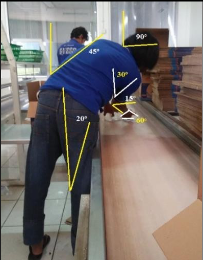Workload Risk Analysis of the Optimal Packing Division Using RWL, REBA, and OCRA Methods on Musculoskeletal Disorders
Analisa Resiko Beban Kerja Divisi Packing Yang Optimal Menggunakan Metode RWL, REBA, dan OCRA Terhadap Keluhan Musculoskeletal Disorders
DOI:
https://doi.org/10.21070/pels.v2i2.1327Keywords:
Rapid Entire Body Assessment, Recommended Weight Limit, Occupational Repetitive ActionAbstract
Physical work and body posture will be related to the workload obtained, because it will affect production results. Based on the observations of 4 packing operators, there are problems with how they work, so there are some defective/failed to packs products, because some operators complain of fatigue, especially in the hands, back, and feet, and do not focus on one job. From material lifting, and packing processes to cleaning up failed products and products that fall from the conveyor. The methods used are the Recommended Weight Limit (RWL), Rapid Entire Body Assessment (REBA), and Occupational Repetitive Action (OCRA). can find out the level of risk category of each packing operator, and can improve posture/body position and workload carried out, with the aim of improving the workings of the riskiest operators in order to be optimal at work. The results of the study were operators 3 and 4 with higher working risk levels. The workload for operators 3 0.80 ± LI = did not cause any risk to the activity performed and the weight of the load lifted, resultant posture score 9 (very risky), right-handed activity 6.7 (medium risk), and left-handedness 11.9 (very risky). Whereas operator 4 obtained a workload yield of 1.14 li LI, which may increase the risk of complaints of waist pain and weight lifted beyond the standard, posture 6 (medium), right-hand activity 11.2 (high risk), and left hand 6.7 (medium risk).
Downloads
References
P. Hariyadi, “Pengemasan Pangan,” Direktori Ind. Kemasan Indones., pp. 1–27, 2008.
D. J. Permana, “PERANCANGAN PENGEMBANGAN PRODUK AIR MINERAL DALAM KEMASAN (AMDK) MERK ‘XYZ’ 600 ML BERDASARKAN MODEL KANO DAN DIMENSI KUALITAS GARVIN,” J. Appl. Bus. Econ., vol. 6, no. Juni, pp. 300–311, 2020.
D. Rahmayanti, D. Meilani, H. R. Zadry, and D. A. Saputra, “Perancangan Produk & Aplikasinya,” archives, p. 72, 2018.
Wignjosoebroto, Sritomo. (2000).”Ergonomi, Studi Gerak, dan Waktu”. Surabaya: Guna Widya
L. S. Tarwaka, Solichul HA.Bakeri, Ergonomi Untuk Keselamatan, Kesehatan Kerja dan Produktivitas, 1st ed. 2004.
P. Thomas R Waters, P. Vern W-Anderson, and A. G. PhD., “Buku Waters (1994),” 1994.
S. Musyarofah, A. Setiorini, M. Mushidah, and B. Widjasena, “ANALISIS POSTUR KERJA DENGAN METODE REBA DAN GAMBARAN KELUHAN SUBJEKTIF MUSCULOSKELETAL DISORDERS (MSDs) (PADA PEKERJA SENTRA INDUSTRI TAS KENDAL TAHUN 2017),” J. Kesehat., no. 1, pp. 24–32, 2019, doi: 10.23917/jk.v0i1.7669.
Y. Hidjrawan and A. Sobari, “Analisis Postur Kerja Pada Stasiun Sterilizer Dengan Menggunakan Metode Owas Dan Reba,” Optimalisasi, vol. 4, no. April, pp. 1–10, 2018.
R. P. Edi, “Penerapan Metode Occupational Repetitive Action (OCRA) untuk Mengurangi Masalah Ergonomi dan Gangguan Muskuloskeletal pada Stasiun Kerja Barrel di PT . Soen Permata,” Sci. J. Ind. Eng., vol. 2, no. 1, pp. 56–64, 2021.
S. Sunardi and Y. W. Putri, “ANALISIS RISIKO MUSCULOSKELETAL DISORDERS DI STASIUN KERJA PELAPISAN & STASIUN KERJA PENGOVENAN PRODUKSI TUNGKU KOMPOR MENGGUNAKAN METODE OCRA (STUDI KASUS DI PT. XYZ),” J. Manaj. Ind. dan Teknol., vol. 1, no. 04, pp. 140–150, 2020, doi: 10.33005/juminten.v1i4.80




